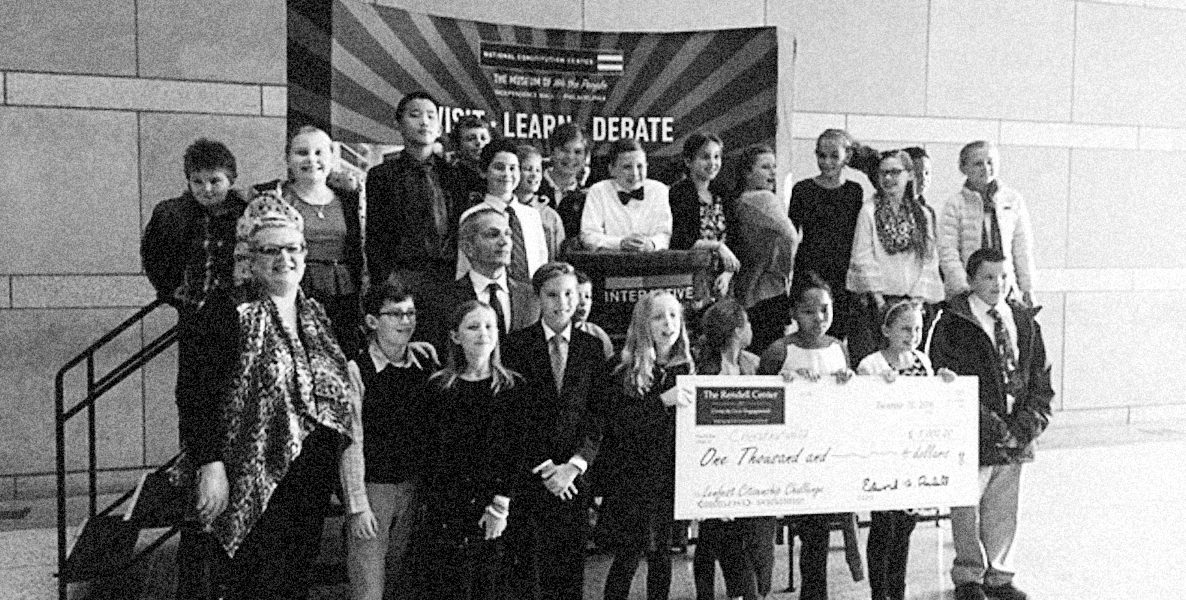Here’s the thing about the Electoral College: Until the last six weeks, hardly any of us gave it much more than a passing thought beyond the TV news ticker every presidential Election Day. Most of us still don’t understand how this group of “electors” gets to decide who becomes President. And usually we don’t care.
This year, of course, the electors and their strange only-in-America responsibility have become front page news, the target of letter-writing campaigns and fervent pleading from some of those who fear a Trump presidency. Suddenly, people were asking: Shouldn’t we overturn the Electoral College if it does not lead to the election of the person with the most actual votes?
Want an answer? Find yourself one of several hundred fifth graders who participated in this year’s Lenfest Citizenship Challenge, organized every year by the Rendell Center for Civics and Civic Engagement to consider a different constitutional issue. This year’s oddly prescient challenge to fifth graders throughout the region was to write a class essay answering the question: Should the Constitution be amended to eliminate the Electoral College system for selecting the President and replace it with the national popular vote?
The contest entries were due before the election, and the students presented their ideas to a panel of judges at the Constitution Center before Monday, when the Electoral College’s vote affirmed Trump’s victory—and the futility of activist efforts to get electors to switch their votes. (In fact, more electors tried to defect from Clinton than from Trump.) But the nature of this year’s campaign, and post-election season, made what seemed like it could be a dense topic far more lively than anyone expected in September.
“We picked it because of the election,” says Judge Midge Rendell, who founded the Center in 2013 to jump start civics education in schools. “But we didn’t realize at the time how relevant it really would be. It’s complicated—but the kids really figured it out.”
It was the winning team that captured a nuance that would change our system just enough to remain fair to both rural states and individual voters. At Haverford’s Chesnutwold Elementary, Natascha Doeller’s class argued to keep the Electoral College—but to amend it, so votes are allotted through “proportional representation,” in which a candidate receives a number of Electoral College votes proportional to the number of popular votes in each state.
After six weeks of research, discussion, debate, and writing, 60 percent of the 120 schools that submitted essays said the Electoral College should remain, as it ensures even smaller, rural states get a say in who leads us. (Of the top 10, only two schools advocated for a popular vote winner.)
But it was the winning team that captured a nuance that would change our system just enough to remain fair to both rural states and individual voters. At Haverford’s Chesnutwold Elementary, Natascha Doeller’s class argued to keep the Electoral College—but to amend it, so votes are allotted through “proportional representation,” in which a candidate receives a number of Electoral College votes proportional to the number of popular votes in each state.
Here’s how they explain it in their winning entry:
“‘Winner takes it all’ is not only a lyric from a popular song or the mantra of some avid sports fans, it is the system under which the Electoral College functions. Currently if a candidate wins the popular vote in a specific state, they receive all of the electoral votes from that state. So if one candidate receives only one more popular vote than the other candidate, that first candidate receives all of the electoral votes. This is the one aspect of the Electoral College that we believe needs to be changed. Electoral votes should be assigned by proportional representation. This makes it possible for all the candidates to receive electoral votes. Nebraska and Maine use this system and so should the rest of the 48 states.”
The essay contest is part of the Rendell Center’s mission to boost civics education in schools both locally and nationally. Every year, the Center runs literary mock trials, in which a character—say the Big Bad Wolf—is put on trial, to teach about how our court system works. (Judge Rendell often serves as a judge in these trials.) It offers civics curriculum help to schools around the city, and holds an annual civics training session for teachers over the summer. Graduate Hospital’s E.M. Stanton is a pilot school, where the Center tests out different ways of imparting knowledge about American civics to students. It’s all part of an effort to recapture a piece of American education that has been lost—understanding our political and legal process—at the same time as participation in the electoral process has steadily declined.
This is the fourth year of the essay contest, which always focuses on some aspect of the Constitution. (The questions are sent out in September, on Constitution Day.) Previous years looked at whether Presidents should be native-born; how to raise voter turnout; and the Fourth Amendment’s search and seizure laws. Rendell Center Executive Director Beth Specker said this year’s participation was slightly lower than in the past, she thinks because of the complicated nature of the question. The runners-up this year were Glenwood Elementary School in Media; South Philly’s Eliza B. Kirkbride School; and Abington’s McKinley Elementary. The top 10 teams all receive a civic library for their school, with books and lessons.
They also all presented their cases to a panel that consisted of Gov. and Judge Rendell; Constitution Center President and CEO Jeffrey Rosen; and Committee of Seventy’s David Thornburgh. To a standing-room only crowd, they presented skits and explanations, and then answered questions from the panel. The governor asked Doeller’s students about this year’s election, in which proportional representation would have meant neither candidate got the required 270 Electoral College votes. Their answer: Change the Constitution so a simple majority wins.
Doeller, a 17-year Haverford School District Teacher, says their proposal came out of a stalemate: “A little over 20 of the students wanted to get rid of the Electoral College,” she says. “It was like 12 angry men in the courtroom with the others. I told them we needed either to convince each other to shift their view, or to compromise.”
Judge Rendell says the contest’s judges considered both the essay and the presentation when deciding on a winner. This year, it was hard to choose. “I know more about the electoral college now than before I did because of these kids,” she says. They announced the three finalists in front of a standing room only crowd of parents, students and teachers at the Constitution Center. Doeller, who has entered and placed in the top three all four years, won for the second year in a row. She says her students will vote on how to spend their $1,000 prize money for the school.
![]() “Whether or not they’re in the top 10, or win, the conversation, and problem-based, real-life learning is so valuable to these kids,” Doeller says. “This is an immense undertaking every year. It is also my favorite thing I do every year.”
“Whether or not they’re in the top 10, or win, the conversation, and problem-based, real-life learning is so valuable to these kids,” Doeller says. “This is an immense undertaking every year. It is also my favorite thing I do every year.”





